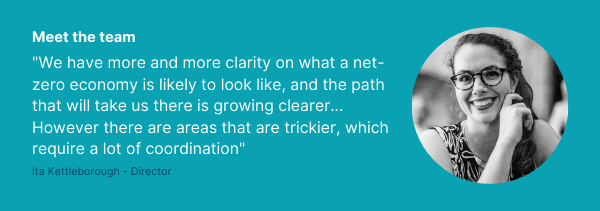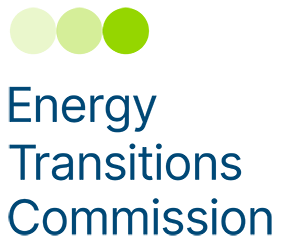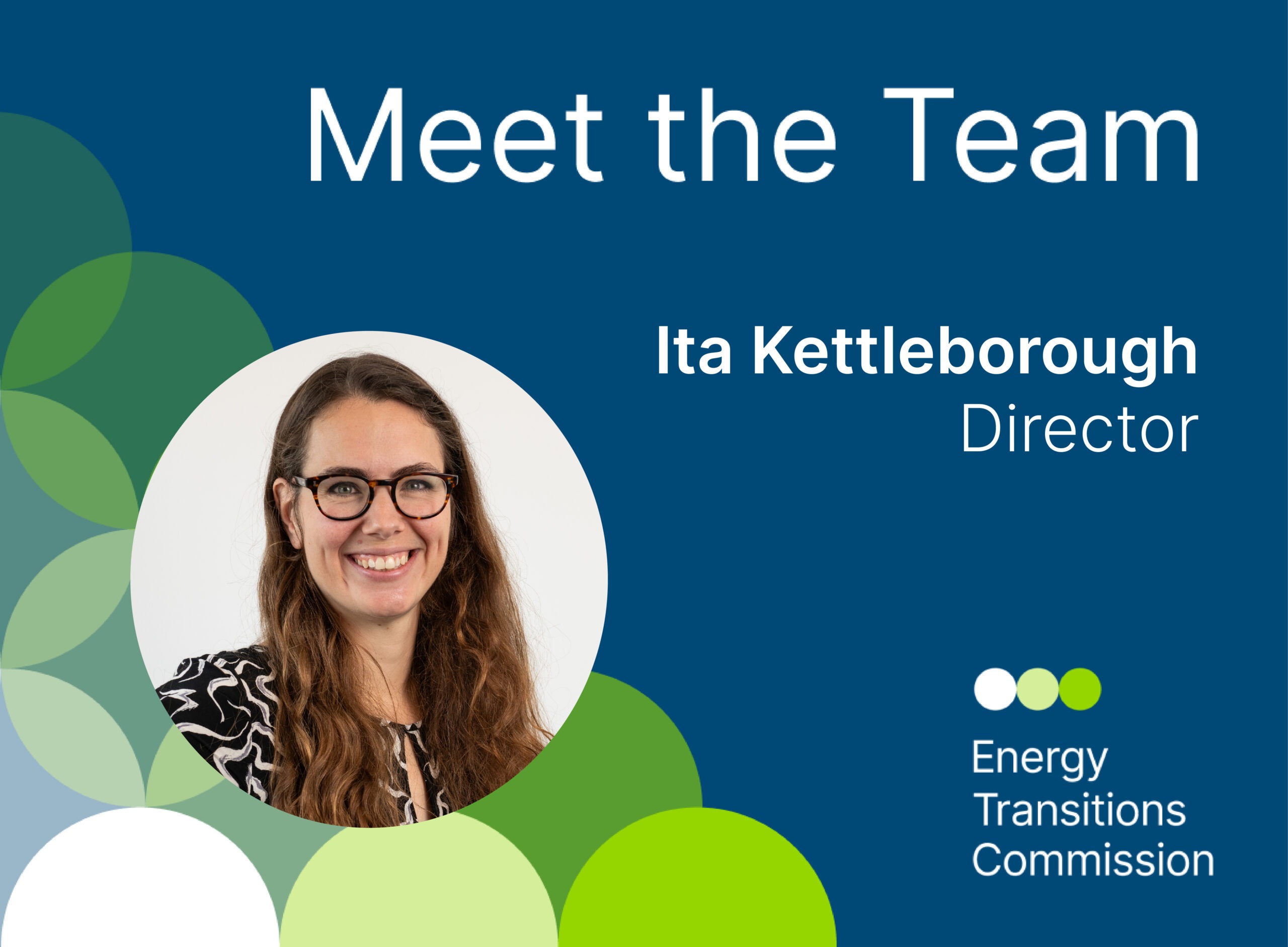Get to know Ita Kettleborough, Director of the Energy Transitions Commission. For the last two and a half years Ita has been leading our analytical and regional programmes and the central secretariat, in her role as Deputy Director. During this time Ita has overseen the Making Mission Possible Series and led the ETC into new areas of work.

- What made you join the ETC?
I wanted to join an organisation where I could focus exclusively on the energy transition. Two key things about the ETC excited me.
Firstly, the thought-leadership and business-led approach – the Commission brings together a diverse cross-sector, cross-region, high ambition group of corporates and other organisations. That ETC analysis is developed with and backed by this group was really exciting to me.
Secondly, that the ETC relentlessly focused on what is possible and what we can do. The climate crisis can feel overwhelming, with many of the indicators showing that we are currently heading in the wrong direction. In this context I was really drawn to an organisation that really digs into what we need to do to build a net-zero future and how. Given we can already identify many of the critical actions, we must act on those today and influence others to make these a reality. That is what the ETC does.
- What is your most proud achievement at the ETC?
I would point to three things. Firstly, the analytical work we’ve done around the Making Mission Possible Series. It’s been great to really dive into the question of how do we get from where we are today to where we need to be – on clean electrification, on clean hydrogen, on bioresources and very soon on CCUS too. We have broken down the necessary steps and identified what must happen now to accelerate progress at the required pace. Identifying the tangible actions for a successful transition has been really exciting.
Secondly, I’m proud of how we have grown the Commission. The Commission itself has almost doubled since I joined, both in terms of the organizations that we have around the table, and also our regional presence. We’ve gone to 7 regions and we’re looking at two more this year. Alongside this, we have strengthened and expanded our sector work through MPP. I’m proud to see the ETC’s impact and influence multiply.
Then the third achievement is the team. It has been incredibly fun to build a team of people who are so passionate about the mission of the ETC and how we can build a net-zero economy. Despite a tough few years with COVID, we still have a strong team that is excited to work together on these challenges.
- What does the energy transition mean to you?
Energy drives all sectors of our economy and society, so the energy transition really encompasses a whole societal transformation. The energy transition means building a decarbonised and a more resilient energy system. One that stays within broader planetary boundaries.
It’s a challenge we can and must meet, to address the existential threat climate change poses to our planet and our way of life. And the speed at which we must change requires that we take a wholistic perspective, understanding where the energy transition intersects with other systems. For example, where the energy and food & land use systems intersect which we explored in our bioresources work, or where more efficient use of materials and resources can make the energy transition fundamentally easier.
- What do you feel is the biggest obstacle to net-zero?
We have more and more clarity on what a net-zero economy is likely to look like, and the path that will take us there is growing clearer. There are many elements of the transition we now know will be far easier for us to implement than we thought 5-10 years ago. Either because the zero-carbon options are cheaper than carbon-intensive options, as we have seen with renewables, or because the group of decision makers is actually quite small, small enough that those people can get around a table to hash out what needs to change.
However there are areas that are more tricky – for example where there’s less clarity on the technologies. In the chemicals industry a suite of decarbonisation technologies are likely to play a role, with different balances of technologies in different places.
Or where the actions needed have an additional cost and someone has to cover those costs. Many of the actions around deforestation, reforestation, and early coal phase-out in emerging markets have a cost and will require someone to foot the bill.
There are also areas of the transition where the coordination challenge is really big. In colder northern latitude places, the building heating decarbonisation challenge is tricky because it’s many, many different building owners that must all individually act.
So the hurdles will be where it’s less clear, more expensive, or it requires a lot of coordination. But the good news is that is not the case for all areas of the transition.
- What are you most excited about that’s coming up at the ETC?
I am really excited by our work on Barriers to Clean Electrification. All our work over the last few years has shown that there’s no ‘silver bullet’ in this transition, but we do know that clean electrification will be key to solving the challenge we face. Building the clean power system of the future, at pace, and in a way that enables broader sectoral decarbonisation is one of the most urgent priorities we face today.
We are making some progress – renewables are a growing share of the global power mix. But we are going nowhere near fast enough in most regions of the world. And we know that it’s not only about building more renewable energy generation. It’s also about building a system that can balance that renewable energy, with the transmission and distribution networks to transport it to where it is needed. So while we are seeing progress, we need to accelerate action this decade. Recognising the hurdles early, and breaking down the solutions will allow us to increase the pace of change. That is why our work around barriers is really critical.
I’m also excited about the new regional programmes we’re exploring this year. We’re beginning to look at questions around power sector expansion and decarbonisation in Africa, and also developing in effort in South East Asia, possibly Indonesia.
And amongst all this, we are looking at the question of material and resource needs and accelerating energy productivity, which will allow us to collaborate with our materials and resource-use colleagues to understand how we can use materials in the smartest way possible.
- What is the best piece of advice you have received from an ETC colleague?
Adair often reminds us how important it is that we continue to bang the drum on what the energy transition will entail. While we have convinced ourselves of the key actions which need to happen urgently, we have to keep repeating the key messages externally, again and again. Many policy makers, and some industry decision makers, still haven’t internalised the profound transformation required in our energy system – for example, just how much renewable electricity we will have to use to decarbonise our economy. We must keep repeating these messages – even when we feel we have said them enough!



